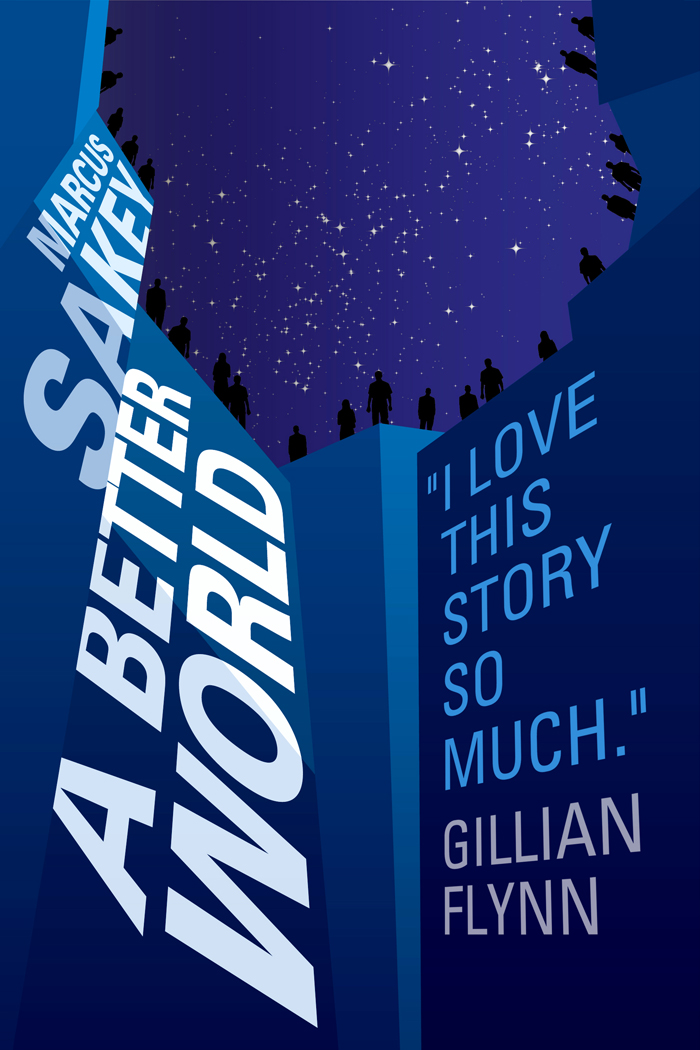'A Better World' (US 2014): Book Excerpt


Marcus Sakey's thrillers have been nominated for more than fifteen awards, named New York Times Editor's Picks, and selected among Esquire's Top 5 Books of The Year. His novels "Good People" and "Brilliance" are both in development as feature films, and he just published "A Better World," the second installment of the "Brilliance" series. Sakey is also the host of the acclaimed television show Hidden City on Travel Channel. He contributed this article to Live Science's Expert Voices: Op-Ed & Insights.
In the United States, 1 in 110 children are born with autism. While autism poses many challenges to an individual, it is not without some benefits. That is especially true for individuals who fall within the parameters of a savant on the autism spectrum, such as Kim Peek, a savant with astounding intellectual abilities also known for inspiring the film Rain Man.
In his critically-acclaimed "Brilliance" series — which has spawned an upcoming motion picture — Marcus Sakey explores what would happen if the social challenges that accompany savantism were eliminated, leaving only the higher-intelligence advantages. Those "brilliants" would not simply change society, they would rock the foundation of the world.
"What had grabbed me was how that would affect the rest of us. In other words, the series wasn't about the gifts," said Sakey, "It was about the world. It was about, essentially, the rest of us, and our reactions to the exceptional appearing in our midst."
Read more in Sakey's essay "Autism, Bourbon and Lies: Inspiring 'The Brilliance Saga'" on Live Science and in the excerpt below from the second novel in the "Brilliance" series, "A Better World."
Chapter 1
Excerpted from "A Better World" by Marcus Sakey. Copyright 2014. Published by Thomas & Mercer. Used by permission of the publisher. Not for reprint without permission.
Get the world’s most fascinating discoveries delivered straight to your inbox.
Air Force One was an hour shy of D.C. when the Secret Service agent told Cooper that he was wanted in the conference room.
Across a military and agency career, Cooper had ridden on posh private jets and rattling Army transports, had soared in a glider over the Wyoming desert and jumped out of a perfectly good C-17 with a chute on his back. But Air Force One was unlike any aircraft he'd ever been on.
A customized 747, the plane had three decks, two galleys, luxury sleeping quarters, a fully-equipped surgery, national broadcasting capabilities, first-class seating for the press corps and the secret service, and the capability to fly a third of the way around the world without refueling—which it could do mid-air.
Cooper unbuckled his seatbelt and walked fore. The agents at the door of the conference room nodded at him.
The room was a mobile version of the situation room, with a broad conference table and plush chairs. A holo-conferencing screen showed a sharp tri-d of Marla Keevers in her office at the White House. The president sat at the head of the table, with Owen Leahy at his right and Holden Archer at his left.
Archer glanced at him, said, "Tulsa, Fresno, and Cleveland have lost power."
President Clay said, "Marla, how bad is it?"
"Based off satellite imagery, we estimate that the entire metro area of all three cities has gone dark."
"Why based off satellite imagery?" Clay asked.
"Because engineers in charge of the power grid for each region report no unusual activity. All substations report back green."
"A cyber attack," Leahy said. "A virus tells the system to send massive amounts of power from the grid to individual transformers, blowing them out, while at the same time co-opting the safety systems so that there's no warning indicator."
"Yes," Keevers said. "That's what's got the engineers rattled. Work crews say there's no damage to the substations. The transformers are working. They're just not providing power to the cities."
"How is that possible?"
"The Children of Darwin," Cooper said.
Keevers nodded. "It would appear our protocols have been rewritten. It would take abnorm programmers to pull that off."
"So what you're telling me," the president said, "is that a terrorist organization has turned off three cities like they flipped a switch?"
"I'm afraid so, sir. With some anomalies. In each city, several regions still have power. Two in Fresno, three in Tulsa, and two in Cleveland."
The image of Keevers was replaced by live satellite footage. The view was haunting. Instead of the riotous glow of cities at night, the holograms showed deep black marked by faint ribbons of light that must have been highways. The only bright spots were in discreet blocks, roughly rectangular, where things looked normal.
"So the virus wasn't a hundred percent effective," Archer said. "It's a small comfort, but it's something."
Cooper leaned forward, staring at the maps. There was a pattern, he was—
Two areas in Fresno, three in Tulsa, two in Cleveland.
What connects them? Some are on major highways, some nowhere near. Some downtown, some not.
And yet this doesn't look random. The virus was too successful everywhere else to have failed completely in these spots.
These areas were left powered on purpose. Which means that they hold some value.
So what unites these seven areas?
—certain. "Hospitals," Cooper said.
Archer looked at the screens, then back at him. "What?"
"Those regions all contain major hospitals."
"Why would terrorists take out the power to three cities, but leave hospitals functioning?"
"Because they need them," Leahy said. He turned to the president. "Sir, I've spoken to the director of the FBI and the DAR, as well as the head of the national institute of health. They all believe, and I concur, that this may be the precursor to a biological attack."
"That doesn't make sense," Archer said. "Why leave the hospitals running if they're trying to release a biological weapon?"
"Because," Leahy retorted, "hospitals are the best way to spread one. People get sick, and they go to the hospital. While there they infect others. Doctors and nurses and receptionists and janitors and patients and families. With a really infectious biological agent, the number of cases can expand massively even under normal circumstances. But because these three cities are lacking food, and now power, the situation is far worse. Instead of resting at home, people will flee. They'll go to stay with relatives, or to second homes. And in the process, they'll swiftly vector the disease across the entire country. Sir, we believe the COD created this chaotic situation to mask their real attack."
"That's a huge stretch," Cooper said. "Abnorms would be just as vulnerable to infection. What good would a biological attack do the COD?"
"I don't know," Leahy said, with a hard look at Cooper. "But the COD are terrorists. We don't know what their endgame is."
"Of course we do. They're upset over the treatment of abnorms, and they want change."
"What are you basing that on, Mr. Cooper? Abnorm intuition?" Leahy smiled coldly. "I understand your sympathy for their situation, but that can't be allowed to color our response."
Would you count my response colored if I called you a close-minded bigot mired in old- world thinking? Instead, Cooper said, "Response to what? You're wasting time on a hypothetical situation when we have actual disasters in these cities. People are starving. With the power out, they'll be freezing, getting desperate, violent. Instead of worrying about phantom attacks, why don't we start getting them some goddamn food and blankets?"
On the screen, Marla Keevers coughed. Press Secretary Archer made an elaborate show of looking at his watch. Leahy fixed Cooper with an icy stare. "Mr. Cooper, your passion is quite touching, but you're a bit above your pay grade here. And you're not qualified to speak to what is or is not hypothetical."
"Maybe not," Cooper said. "But I can speak to what's right." He glanced around the room. You guys don't get me, do you? I don't even want this job, so I've got nothing to lose by telling the truth. "The people need food. They need medicine. They need electricity. That's what we should focus on. That's our job."
"It's also our job to protect them from attack," Leahy fired back. "Food and blankets in Cleveland don't protect people dying in Los Angeles."
Before Cooper could respond, the president said, "Owen, what exactly do you suggest?"
"Immediate quarantine of all three cities, sir. The National Guard has already been called up. Assume federal command, back them up with Army troops, and shut these cities down completely. No one in or out."
For a moment Cooper thought the plane was banking wildly, until he realize that was just his head. "You've got to be kidding me."
"I don't find anything about this funny."
Cooper turned to Clay, expecting to see the same thought, the belief that this was beyond preposterous. Instead, he saw that the president was nervous.
Nervous.
"Sir, you can't possibly consider this. You'd be ordering military action on domestic soil. Turning three cities into police states, revoking people's basic rights. It will cause unimaginable chaos. These cities are already on the brink. Instead of helping, we're locking them up."
"No," Leahy said. "We're temporarily suspending freedom of movement for fewer than a million people. In order to protect three hundred million more."
"Panic. Hate crimes. Riots. Plus, if soldiers are busy quarantining the city, they can't distribute food. All based on nothing but a wild theory."
"Based," Leahy said, "on the collective analysis of the best minds in the intelligence and health services. A group that includes plenty of abnorms. Mr. Cooper, I know you're used to doing things your own way, but this isn't your personal crusade. We're trying to save the country, not play some moralistic game."
Cooper ignored the barb. "Mr. President, when you asked me to join you, you said that we were on the edge of a precipice." You're an intellectual, a historian. You know how these things start. World War One was kicked off when a radical killed an obscure archduke. And nine million people died. "If you do this, we step toward that precipice. Maybe over it."
"And if you're wrong?" Leahy asked. "You say the COD is interested in abnorm rights, but they've made no effort at dialogue. What if what they really want is to kill as many Americans as possible? There are a hundred biological weapons against which we have no ready defense—except quarantine."
The president looked back and forth between them. His hands were on the table, the fingers knit. His knuckles were pale.
Come on, Clay. I know you're scared. We're all scared. But be the leader we need you to be.
The president cleared his throat.
Follow all of the Expert Voices issues and debates — and become part of the discussion — on Facebook, Twitter and Google +. The views expressed are those of the author and do not necessarily reflect the views of the publisher. This version of the article was originally published on Live Science.



